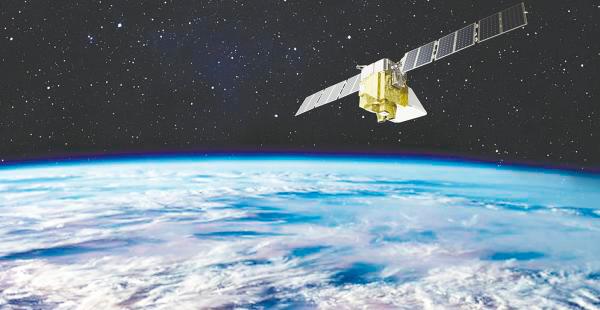CYBERSECURITY solutions are the silent safeguard of our society, ensuring the smooth operation of economies, businesses and critical infrastructure that keep the world running.
While we often associate these solutions with protecting against data breaches and cyber-attacks, one aspect that remains relatively under the radar is the extent to which they also secure our planet’s sustainable future as a whole.
From monitoring environmental changes and predicting natural disasters to protecting satellite systems that track asteroids, cybersecurity plays a pivotal role in keeping us safe from potential catastrophes.
It is this unseen yet crucial aspect of cybersecurity that we will explore, shedding light on its significance beyond just safeguarding digital assets.
As we mark Earth Day this year, let us reflect on how cybersecurity solutions have evolved and played a pivotal role in securing life on Earth.
Guardian of our planet
Cybersecurity has come a long way from its early days of simple virus protection. Today, it encompasses a broad range of technologies and strategies designed to protect networks, devices and data from unauthorised access and cyber threats.
As our reliance on digital technology has grown, so too has the importance of cybersecurity in safeguarding critical infrastructure, including those vital to our societal, environmental and overall planetary well-being.
One of the most significant areas where cybersecurity intersects with environmental protection is in the monitoring and management of satellite systems.
Satellites play a crucial role in tracking environmental changes, predicting natural disasters and even detecting asteroids that can pose a threat to our planet.
However, these satellites are vulnerable to cyber attacks that can disrupt their functionality or manipulate their data.
A notable case study is the 2019 incident involving the European Space Agency’s Aeolus satellite, which plays a crucial role in gathering data for climate research and weather forecasting.
Cyber attackers attempted to gain control of the satellite’s communication systems, aiming to disrupt its data transmission and potentially compromise the accuracy of crucial environmental data. Thankfully, the attack was detected and mitigated in time, preventing any damage to the satellite’s operations and ensuring the continued reliability of its vital environmental monitoring functions.
This successful detection and mitigation of the attack on the Aeolus satellite underscores the critical importance of cybersecurity measures in protecting our planet, highlighting the need for vigilant and robust defences to safeguard the data that informs our understanding of Earth’s changing climate.
How cybersecurity factors into environmental protection
The buck does not stop there when it comes to the critical role that cybersecurity plays in securing our planet. For example, cybersecurity infrastructure can be essential in protecting satellite systems used for tracking and predicting the paths of asteroids headed towards Earth.
Another instance is the protection of Scada (Supervisory Control and Data Acquisition) systems, which are crucial for monitoring and controlling industrial processes, including those in the energy sector.
A cyber attack on these systems can result in environmental disasters such as oil spills or nuclear accidents in worse-case scenarios, or similar to the case of the wide-reaching Viasat hack, which resulted in critical malfunctions in the operation of renewable energy infrastructure.
We are proud that Check Point’s cybersecurity solutions are pivotal in protecting such advanced and essential Scada systems from such threats, thereby safeguarding our environment from potential harm while ensuring the steady generation of climate-friendly renewable energy sources.
Smart solution
The emergence of smart cities, smart buildings, smart transportation and even smart health signifies a leap towards a more efficient, sustainable and interconnected environment.
These advancements integrate various services, from traffic and emergency management in urban settings to global shipping coordination and remote healthcare, through digital platforms.
They rely heavily on real-time data exchange and interconnected networks to improve living standards, streamline transportation, enhance energy conservation and offer advanced medical care remotely.
However, the backbone of these systems is the cybersecurity measures, which ensure the reliability and safety of these critical services.
Recent cyber incidents, such as the Colonial Pipeline ransomware attack and the SolarWinds hack, underscore the vulnerabilities that come with increased connectivity.
These events demonstrate the potential chaos and severe repercussions that cyber attacks can have on national security, economic stability and public safety.
Cybersecurity is not merely a technical necessity but a critical infrastructure requirement that protects essential services and sensitive information across sectors including healthcare, energy, finance and government.
Secure and sustainable future
As we celebrate Earth Day, we also recognise the integral role that cybersecurity plays in ensuring a long and sustainable future.
The development of cybersecurity solutions, as demonstrated by Check Point’s technologies, has been crucial in safeguarding critical infrastructure that prevents against potentially large-scale environmental catastrophes, while ensuring the sustainability of our digital and physical worlds.
It is a testament that in our interconnected world, securing our digital realm is inseparable from securing our Earth.
Finally, it is important to remember that our planet is the only home that we have. We must continue to work diligently to shape a future where technology and sustainability go hand in hand, with the hope that we can play our part in shaping a secure and sustainable world for generations to come.
The writer is an environmental, social and governance manager at Check Point Software Technologies. Comments: letters@thesundaily.com









